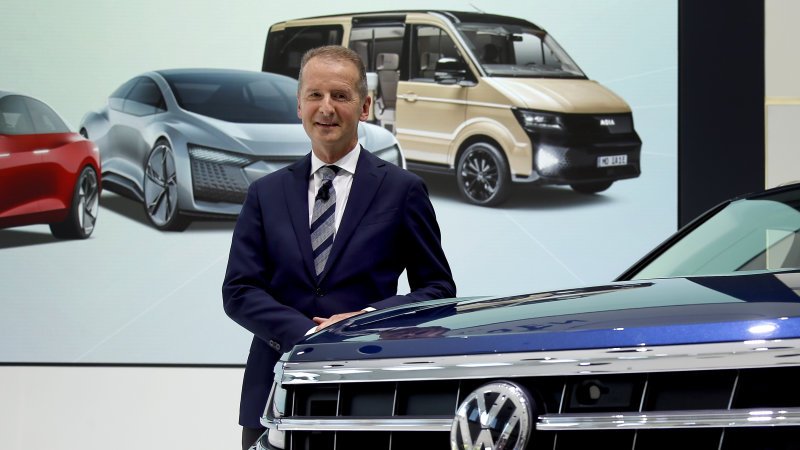VW talk of alliance with Ford could include pickup trucks

Volkswagen boss Herbert Diess will outline a 10-year plan on Nov. 16 to slash research costs by working with rivals, a step which would sideline Audi as the group's leading development center.
The chief executive will present his plan at a meeting of the German carmaker's supervisory board, two sources told Reuters.
It will explore potential alliances with Ford and others to develop autonomous and electric vehicles (EVs). If approved by the board, it would signal a major departure from VW's standalone efforts to build them and diminish Audi's importance as an engineering hub.
The strategy to deepen existing cooperation with Ford could include the U.S. carmaker supplying a pickup truck platform and some engines to VW, one of the sources said. Meaning the next VW Amarok pickup could be a twin to the Ford Ranger.
Diess told Automotive News, "If the Ford relationship works out well, we would have an Amarok successor, which would be then appropriate for sales worldwide — potentially as well for the United States." Meanwhile, he said VW is also still considering a unibody truck such as the Atlas Tanoak concept shown by VW and driven by Autoblog earlier this year.
VW could also buy a stake in Ford's autonomous cars program and give Ford access to its MEB electric cars platform, they said.
Automakers globally are considering teaming up to save money on development, which cost VW $13.1 billion in 2017, in the race to get EVs and self-driving cars on the road.
Savings are particularly important for VW as it tries to get its business back on track after an emissions scandal. It faces a big bill to make its combustion engines comply with new anti-pollution rules.
"The strategy plan doesn't only cover the next five years, but looks a decade ahead," one of the sources said.
A VW spokesman declined to comment on the agenda of the company's next supervisory board meeting.
Audi spokesman Peter Oberndorfer said no formal decisions have been taken about reassigning Audi's responsibilities on autonomous driving within the group.
Diess also aims to cut duplicate efforts on technology development among VW's different brands, and to seek greater economies of scale by partnering with software companies, carmakers and battery cell manufacturers.
Ford has said it has an agreement with VW to discuss potential collaborations across a number of areas but it was premature to provide details.
VW and Ford are under pressure to roll out more EVs in Europe, after the emissions scandal, which originated at Audi.
Emissions rules in Europe are still being finalized but VW would need to raise its share of fully electric vehicles to 30 percent of new car sales to cut average fleet emissions of carbon dioxide by 30 percent by 2030.
Audi, whose slogan is Vorsprung durch Technik or Advantage Through Technology, has been VW's research and development hub for decades. But its engineers developed the engine management cheating software that masked excessive pollution levels.
The departure of senior Audi executives after the scandal has left a leadership vacuum just as carmakers are trying to keep up with innovations by software and technology companies.
Audi's stumble also comes as Diess is tightening his grip on the sprawling multi-brand car and trucks group, which includes Skoda, Seat, Audi, Porsche, Bentley, Bugatti, Lamborghini, Ducati, Scania and MAN.
To cut the costs of developing an electric car platform for premium vehicles, VW has already bundled development between Porsche and Audi.
"The pendulum is swinging back in the direction of centralization," a senior Volkswagen executive told Reuters
Audi has been developing autonomous technology for VW, Audi and Porsche. It built the A8, a car with advanced self-driving features, but its efforts for a fully autonomous car have fallen behind rival companies like Alphabet Inc's Waymo.
"We want to have access to a self-driving system and we are speaking with relevant players. It is very expensive to develop and others are already well advanced," Chief Financial Officer Frank Witter said in a phone call with reporters on Tuesday.
Diess fears German carmakers will lose their edge unless they make radical changes. He said last month there was a 50-50 chance they would still be among the global elite in 10 years' time.
Electric cars are still too expensive to produce for mainstream consumers to afford them and so carmakers must find savings or greater economies of scale to make them cheaper.
Related News
